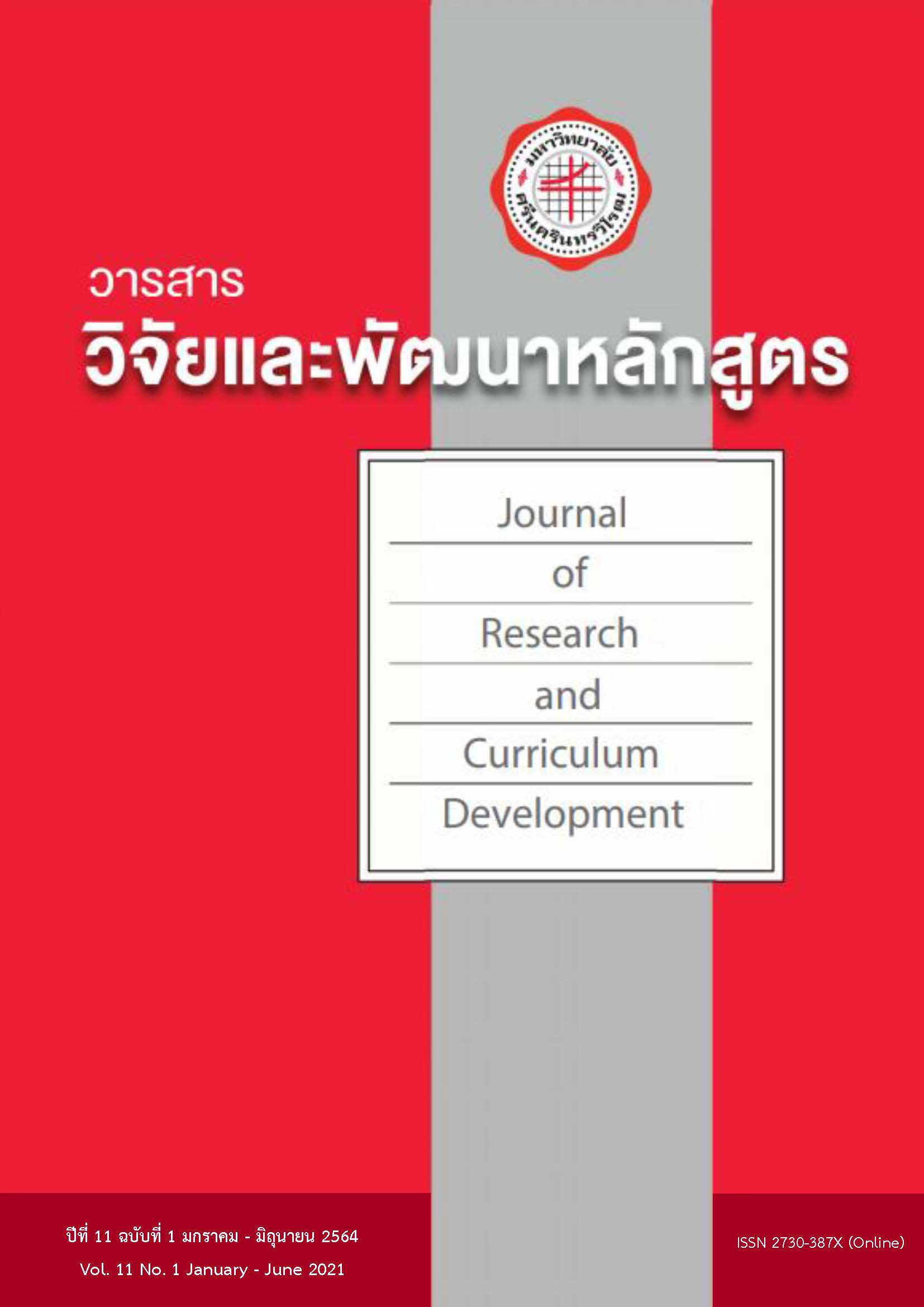ผลการใช้รูปแบบการยกระดับคุณภาพการเรียนการสอนตามแนวคิด GPAS 5 Steps เพื่อเสริมสร้างทักษะการเรียนรู้ของนักเรียนในยุคไทยแลนด์ 4.0 ระดับชั้นประถมศึกษา
Keywords:
To enhance the quality of teaching, GPAS 5 Steps, Thailand 4.0, Elementary EducationAbstract
The purpose of the research is to study the effect of using the model to enhance the quality of teaching Based on learning according to GPAS 5 Steps to enhance students’ learning skills in Thailand 4.0 in the elementary education as follow; 1) teachers: 1.1) knowledge and understanding of teaching 1.2) teaching design ability, and 1.3) teaching management ability 2) Students: 2.1) Higher Order Thinking 2.2) Innovator skills 2.3) Innovative ability and 2.4) morality and ethics. Target groups are administrators, teachers and elementary school students of Demonstration School Valaya Alongkorn Rajabhat University, academic year 2018. Research instruments and data collection are divided into 2 parts, which are teachers and students, as follows: Teachers; 1) the model to enhance the quality of teaching Based on learning according to GPAS 5 Steps. 2) Knowledge and Understanding of Teaching Test for teachers, and 3) Assessment of Teaching management. Students; 1) Higher Order Thinking Assessment 2) Innovative skills Assessment 3) the ability in Innovation Assessment 4) Morality and Ethics Assessment. The data were analyzed by using percentage, mean and standard deviation.
The result of the research shows that; teacher’s aspects 1) knowledge and understanding about teaching were at the good level, 2) Teaching design ability of the teachers were at the highest level, and 3) teaching management ability of the teachers were at the good level.; student’s aspects: 1) Higher order thinking of the students were at high level, 2) Innovator skills of the students were at high level, 3) Innovative ability of the students were at high level, and4) Morality and ethics of the students were at the highest level.
References
กระทรวงศึกษาธิการ. (2551). กรอบความคิดเพื่อส่งเสริมและพัฒนาคุณธรรมจริยธรรมที่เน้นความมีระเบียบวินัยและความเป็นประชาธิปไตย. กรุงเทพฯ : โรงพิมพ์คุรุสภาลาดพร้าว.
วสันต์ สุทธาวาศ และธีระวัฒน์ จันทึก. (2558). วิธีพัฒนาศักยภาพความเป็นนวัตกรการศึกษา. วารสารวิชาการ viridian E-Journal Silpakorn University ฉบับภาษาไทย สาขามนุษยศาสตร์ สังคมศาสตร์ และศิลปะ, ปีที่ 9 ฉบับที่ 1 มกราคม – เมษายน 2559, 748 – 767.
ศิริวรรณ วณิชวัฒนวรชัย. (2559). การจัดการเรียนรู้ที่เน้นความแตกต่างระหว่างบุคคล. วารสารศึกษาศาสตร์ มหาวิทยาลัยศิลปากร, ปีที่ 13 ฉบับที่ 2 พฤศจิกายน 2558 - มีนาคม 2559, 24 – 38.
สถาบันพัฒนาคุณภาพวิชาการ (พว.). (2561). เอกสารการอบรมการจัดการเรียนรู้ GPAS 5 Steps. กรุงเทพ: บริษัท พัฒนาคุณภาพวิชาการ (พว.) จำกัด.
สุวิมล สพฤกษ์ศรี. (2562). ชุมชนการเรียนรู้วิชาชีพโดยผสมผสานเทคโนโลยีเพื่อเสริมสร้างสมรรถนะ การจัดการ เรียนรู้โดยใช้ศิลปะเป็นฐานที่ส่งเสริมความสามารถในการสร้างสรรค์นวัตกรรม ของนักเรียนระดับประถมศึกษา. (วิทยานิพนธ์ปรัชญาดุษฎีบัณฑิต). นครปฐม : มหาวิทยาลัยศิลปากร.
สำนักงานเลขาธิการสภาการศึกษา กระทรวงศึกษาธิการ. (2560). แผนการศึกษาแห่งชาติ พุทธศักราช 2560 – 2579. บริษัท พริกหวานกราฟฟิค จํากัด.
สำนักงานคณะกรรมการพัฒนาการเศรษฐกิจและสังคมแห่งชาติ. (2560). แผนพัฒนาเศรษฐกิจและสังคมแห่งชาติ ฉบับที่ 12 พ.ศ.2560-2564. สืบค้น 17 กันยายน 2561, จาก https://www.nesdc.go.th.
สำนักงานคณะกรรมการพัฒนาการเศรษฐกิจและสังคมแห่งชาติ. (2561). (ร่าง)ยุทธศาสตร์ชาติ ระยะ 20 ปี (พ.ศ.2560-2579).สืบค้น 17 กันยายน 2561, จาก http://www.nesdb.go.th.
สำนักงานเลขาธิการสภาการศึกษา กระทรวงศึกษาธิการ.(2561) . มาตรฐานการศึกษาของชาติ พ.ศ. 2561. สืบค้น 19 กันยายน 2561, จาก http://www.http://qa.vru.ac.th/.
DuFour and Eaker. (1998). Professional Learning Communities at Work: Best Practices for Enhancing Student Achievement. Bloomington, IN: National Educational Service.
Hord. (1997). Professional learning communities: Communities of continuous inquiry and improvement. Texas: Southwest Educational Development Laboratory.
McMilan and Chavis. (1986). Sense of community: A definition and theory. American Journal of Community Psychology, 14(1), 6-23.
Richard Dufour. (1998.) Professional Learning Communities at Work: Best Practices for Enhancing Student Achievement. Bloomington, IN: National Educational Service.
Stigler & Hiebert. (1999). Teaching gap: Best ideas from the world's teachers for improving Education in the classroom. New York: Free Press.


